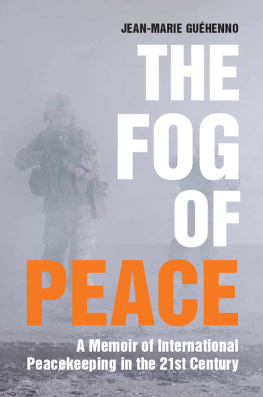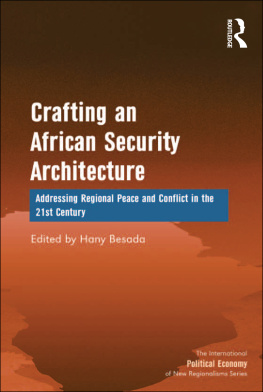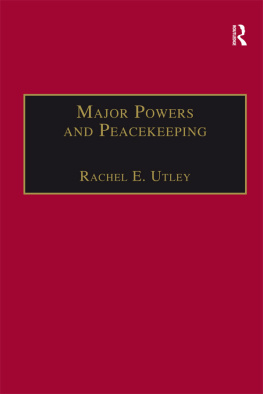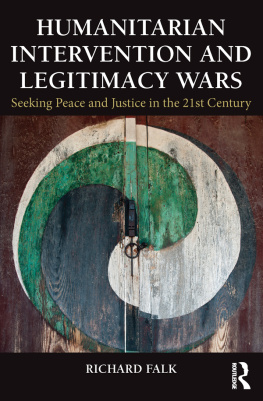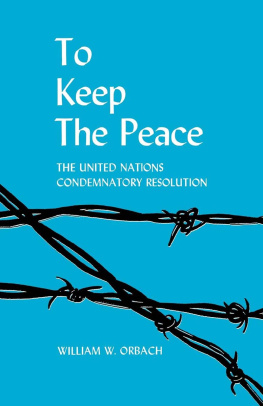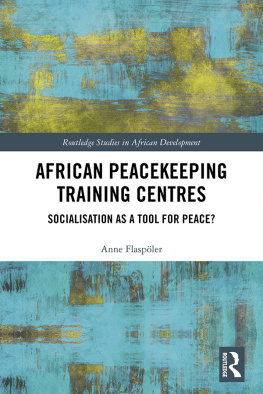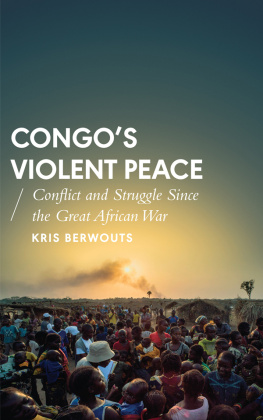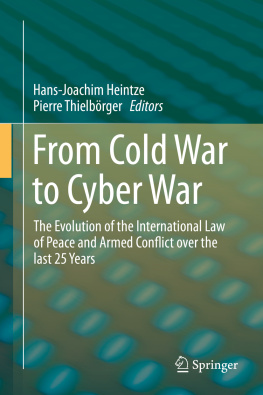Copyright 2015
THE BROOKINGS INSTITUTION
1775 Massachusetts Avenue, N.W., Washington, D.C. 20036
www.brookings.edu
All rights reserved. No part of this publication may be reproduced or transmitted in any form or by any means without permission in writing from the Brookings Institution Press.
The Brookings Institution is a private nonprofit organization devoted to research, education, and publication on important issues of domestic and foreign policy. Its principal purpose is to bring the highest quality independent research and analysis to bear on current and emerging policy problems. Interpretations or conclusions in Brookings publications should be understood to be solely those of the authors.
Library of Congress Cataloging-in-Publication data
Guhenno, Jean-Marie, 1949
The fog of peace : a memoir of international peacekeeping in the 21st century / Jean-Marie Guhenno.
pages cm
Includes bibliographical references and index.
ISBN 978-0-8157-2636-4 (hardcover : alk. paper) ISBN 978-0-8157-2630-2 (pbk. : alk. paper) ISBN 978-0-8157-2631-9 (ebook : alk. paper) 1. Peacekeeping forces History21st century. 2. WarsHistory21st century. I. Title.
JZ6374.G84 2015
9 8 7 6 5 4 3 2 1
Printed on acid-free paper
Typeset in Minion and Univers Condensed
Composition by R. Lynn Rivenbark
Macon, Georgia
PROLOGUE
In the spring of 1989, I was in the city of Gdansk, having lunch with Lech Walesa in the house of his close aide at the time, the Rev. Henryk Jankovski. The trade union leader was a mythic figure for all those who had followed the fight of the Polish people for freedom since the dark days of 1981. Poland once again was a symbol of courage and energy, and its fight for freedom attracted throughout Europe the same kind of sympathy that Polish nationalists had attracted in the nineteenth century. Once again, here was a nation that against all odds was determined to stand its ground and wouldn't be easily brought to submission. As the head of the French Foreign Ministry's policy planning staff, I wanted to understand where that would lead. Would there be another showdown, a new state of siege, and violence? I had all sorts of scenarios in my mind, but none included the end of the cold war. My Polish interlocutors were explaining how the fight of the trade unions had turned into a political fight that was putting the communist leadership of Poland off balance. They wanted to convince a skeptical young French diplomat that indeed what was happening was serious, and to achieve that, they showed me a video that had been shot of a meeting between Margaret Thatcher and Walesa: What better way for a union leader to be taken seriously than to show that even an archenemy of unions had taken him seriously. It was interesting to see how the Iron Lady was peppering Walesa with questions because, with her keen political nose, she may have sensed that this union leader was indeed going to change the world.
The decade that started with the momentous elections in Poland, followed by the collapse of the Berlin Wall, the unification of Germany, and the demise of the Soviet Union, had an optimistic beginning for those who had lived in the richest parts of the world. For many years, some of us had felt slightly uncomfortable that our wealth and security apparently were not transferable. In Europe, there was a sense that the immense waste of the cold war was ending and that the hopes that had existed in 1945, and then were dashed by the divisions of the cold war, could now be realized. Nation states would come together in a new world order, and the states would serve their people instead of sometimes being their jailers. Even more radically, borders would stop being walls behind which governments could commit the worst abuses.
The fall of the Berlin Wall was just the beginning. In 1991, for the first time in the history of the United Nations, the Security Council intervened directly against an oppressive government, adopting Resolution 688 insisting that Iraq allow immediate access by international humanitarian organizations to all those in need of assistance. At the time, this was read by Western nongovernmental organizations (NGOs) as demonstrating a growing sense of solidarity that was chipping at traditional notions of sovereignty: Borders could not be a barrier when people were dying. The fact that the resolution reiterated the commitment of all Member States to the sovereignty, territorial integrity and political independence of Iraq and noted that the violence against the Kurds had cross-border impact and was therefore a threat to international peace and security, was seen as a tactical concession to dying traditions of state sovereignty.
What a difference ten years can make. In the spring of 1999, the picture of the world had become much fuzzier. NATO was conducting a seventy-eight-day bombing campaign over Kosovo to stop the violence of Slobodan Miloevi, but that campaign had not been sanctioned by a resolution of the Security Council. The sense of hope and unity that had briefly existed in the immediate aftermath of the fall of the Berlin Wall had been shattered by a series of failures: first, the long breakup of Yugoslavia and the inability of the international community to stop the violence that accompanied it; second, the collapse of the international humanitarian relief effort in Somalia after U.S. soldiers were killed in Mogadishu and international forces quickly ran away; and third, the genocide in Rwanda, and the passivity of the international community, which mastered the will to deploy troops to evacuate rich Westerners but not to protect poor Africans.
The arrival of the twenty-first century, and the hype that accompanied it as the big cities of the world outdid each other to celebrate the new millennium, was a time of uncertainty and doubts, but not of despair. The postcold war world had not produced the end of history, as Francis Fukuyama had optimistically predicted, nor had it spelled the end of democracy and of the nation state, as I had, a bit glibly, announced in a small book published in 1993, when I was challenging the optimism of the early 1990s. In 2000 the world was all shades of grey.
That is the time when I joined the United Nations to become the head of its peacekeeping department. I was going to turn fifty, and at the time I did not know if I would again be operationally involved in international affairs. I had held interesting positions in the French Ministry of Foreign Affairs. As the head of policy planning in the early 1990s, I had done my best to convince French leaders that the fall of the Berlin Wall was an opportunity, not a threat, and that strengthening European institutions should not be conceived as a way to contain a unified Germany but as a means for Europe to keep its relevance in a world where the end of the East-West divide spelled the end of the centrality of Europe. But my present job was quite removed from the challenges of the postcold war era. I was a senior sitting judge in France's highest financial court, one of its oldest institutions, the Cour des Comptes. It had been created by Napoleon in 1807, but its origins went back to the Middle Ages. And indeed, on solemn occasions, I would put on a long black silk robe adorned with white lace, and make various bows following a ritual that has not changed much since the seventeenth century. I had stayed involved in international affairs, attending conferences, chairing a French defense institute, teaching, and writing articles and books. I had become a commentator, and could have written a guide book on the best conference places of the world. I was trying to make an intellectual difference, but I was not sure I would. How many political scientists are remembered a century after they have written and commented on current events?

